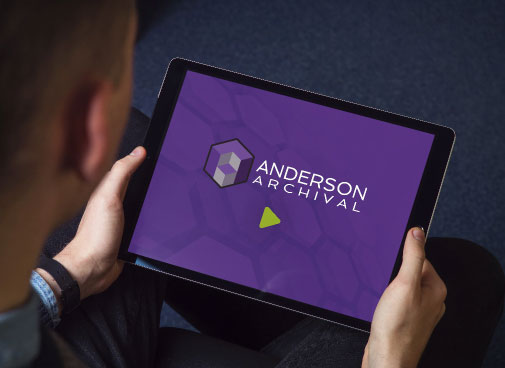Picture this: you’ve spent a long time saving for an expensive tailored suit. Late nights at the office finally paid off, and now you’re prepared to invest in a sleek bespoke suit customized exactly to your specifications.
When you need that suit to be styled and fitted, would you trust just any tailor listed at the top of your search results? Or would you take time to research who will handle your prized possession with the utmost care and caution?
It’s important to find a vendor who will keep your digitized collection safe from time’s unforgiving decay—one who cares about how your materials are handled during each step of the digitization process and beyond.
Ethical Standards for Confidentiality
Materials in your collection are confidential, delicate, and unique. There’s no cookie-cutter approach; every collection is fulfilling a specific community’s needs. Whether that community is the entire world or only for your eyes, ethical values matter. Care and confidentiality should direct every decision in the preservation process.
The Society of American Archivists (SAA) provides resources and guidelines for archivists across the country. This includes a detailed set of core values and a code of ethics that archival experts should use to steer their individual missions.
You need a vendor who incorporates SAA’s ethical standards—professional relationships, judgment, authenticity, security and protection, access and use, privacy, and trust. This not only affects the client-vendor communication, but it dictates how each element of your collection is treated in every phase of the project.
Managing Storage and Destruction
Handing over your unique collection is no easy task. Like in the case of the Harding Affair Letters, you may have struggled to keep certain materials safe from people who wanted to hide or destroy timeless resources. Even if you trust the archivists you’re leaving your collection with, what guarantees they’ll treat the materials in a way that reflects their worth?
Find a team who lets you call the shots on how your materials are handled and stored. You need archival experts who are trained in working with fragile and sensitive documents. Additionally, the restoration techniques and equipment used by your vendor should be focused on maintaining the integrity of each artifact.
The rare client may ask that certain materials be permanently destroyed after preservation. In these cases, ensure your partner has a plan in place! Destruction processes should include responsible, secure methods to dispose of documents and hardware, taking careful consideration to maintain both the client and project’s privacy as well as taking into account environmental standards.
Determining Legal Duty
Privacy and intellectual property are paramount. You should ensure every set of eyes or hands that touch your collection have signed a binding nondisclosure agreement (NDA). This includes archivists, office personnel, and perhaps even janitorial staff who have access to the premises. If there’s any chance someone could stumble across evidence of your collection, a strong confidentiality agreement protects your data at every conceptual step of its digitization.
Along with strict NDAs, make sure your selected vendor sets rigid internal guidelines about handling the intangible aspects of your collection. Staff should be told only the amount of information about a client needed to do their job—that part’s up to you. Your anonymity can be protected just as well as the physical collection.
Confidential Documentation
Every project requires unique documentation, but setting general standards for record-keeping is a strong first step. Successful documentation ensures successful accountability, which is one of SAA’s core values.
At the start of every digitization project, make sure the vendor analyzes each item and the collection as a whole to assess what each task will entail. Have your original manuscripts or photos seen better days and need an extra round of cleanup in the digitization process? Are there torn pages, handwritten notes, or other text obstructions? Standardizing processes keeps the team on the same course, achieving uniform quality on each page of your collection.
Equally important to accountability is providing examples while the project is in progress. Need weekly reports on the development of your future online collection? Want a mockup or wireframe of the database or publication? Care to test the search functions or capabilities of your custom software? Make sure you have a partner committed to transparency and open communication.
Balancing Privacy and Access
Drawing again from SAA’s code of ethics, one of archiving’s ultimate goals is providing access and use. More often than not, if you’re investing the time and funds to preserve a collection it’s because you wish to share it with others. That’s why it’s at the top of SAA’s list of core values. Making your collection accessible is hard to do when it’s limited to boxes of papers or file cabinets in one physical location.
But good access and privacy don’t always play nicely with one another. Finding that middle ground is always possible, but this depends on you and your collection’s individual needs. If you want a database that’s for your organization’s internal use only, your digitization partner should approach your project differently than if you plan to market your collection for public use or charge users for access. Copyright laws, content, and protection of intellectual privacy put additional limits on the scope of access and use of your collection.
Just as you might wear a beautiful custom suit to a large public event or save it for a private party, you should be able to rest assured that your collection is tailored and fitted to perfection, crafted for its specific purpose. You should also feel confident that your measurements won’t be shared with anyone without your permission!
At Anderson Archival, we treat every step of a digitization project as a new challenge, letting your collection’s individual goals guide our path. This includes safeguarding your information and putting the privacy of your collection first. For more information about how we value confidentiality in our archival process, contact us today at info@andersonarchival.com or 314.259.1900.






